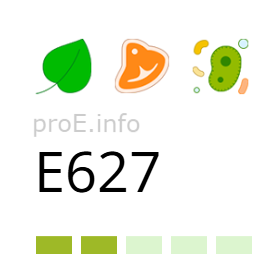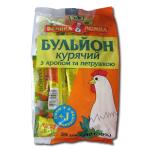
Other names for the additive (synonyms)
General Information
Additive E627 (Disodium 5’-guanylate) — is a food additive classified as a flavor enhancer. It is the disodium salt of guanosine-5'-monophosphate (GMP), an organic compound from the nucleotide group. The chemical formula of the substance is C10H12N5Na2O8P.
In nature, guanosine-5'-monophosphate is found in the tissues of animals and plants. It was first isolated in pure form as a natural component of nucleic acids in the early 20th century during studies of RNA structure.
The structural formula of GMP and disodium guanylate was established in the 1920s–1930s during the development of nucleotide chemistry. Industrial production of disodium guanylate as a food additive became possible only after World War II with the advancement of microbiological fermentation methods.
Today, industrial production of E627 is based on microbiological synthesis (fermentation of glucose using Corynebacterium bacteria) or extraction from natural raw materials, such as dried fish or seaweed.
E627 is a white crystalline powder that is highly soluble in water, odorless, and has a pronounced umami taste.
Due to its relatively high cost, this compound is rarely used in its pure form. It is most often used in combination with other flavor enhancers, particularly with monosodium glutamate (E621) and disodium inosinate (E631), forming a complex additive known as disodium 5'-ribonucleotides.
Effects on the Body
Benefits of additive E627
In the human body, disodium guanylate is metabolized into guanine, ribose, and phosphate — natural components of metabolic processes. It has no biological activity other than enhancing the taste of food and does not exert any physiologically significant effects in small amounts.
Risks of additive E627
According to JECFA, disodium guanylate does not exhibit carcinogenicity, genotoxicity, teratogenicity, or reproductive toxicity. In the 41st report of the Joint FAO/WHO Expert Committee on Food Additives (JECFA), it is stated that guanylic acid and its salts, including E627, have been assigned a group Acceptable Daily Intake (ADI) of “not specified.” This indicates no toxicological concern at typical consumption levels.
However, E627 may cause hypersensitivity reactions in certain individuals, particularly in those suffering from gout (due to purine metabolism into uric acid) and in infants under 12 weeks of age, whose purine metabolism may not be fully developed. These groups are advised to limit excessive intake of the additive.
The EFSA has not yet completed a specific evaluation of E627, but within the European Union, the additive is recognized as safe under general flavor enhancer regulations.
Uses
In the food industry, E627 is used as a flavor enhancer, often in combination with complex aromatic additives. It enhances umami taste and gives products a richer, meaty flavor profile.
Additive E627 is most commonly used in:
- sausages and meat products;
- instant products (soups, noodles);
- snacks: chips, croutons, savory snacks;
- canned vegetables and sauces;
- fish products and seasonings.
Legal Status
Additive E627 is approved for use in the food industry in Ukraine, European Union countries, the United States, Canada, Japan, and other nations.
In Europe and the USA, disodium guanylate holds the status of a safe food additive: in the USA, E627 is included in the GRAS list (Generally Recognized As Safe), while in Europe, according to JECFA, its Acceptable Daily Intake is not specified (ADI not specified).
In the Codex Alimentarius (STAN 192-1995), disodium guanylate is listed as a food additive with the code INS 627, authorized for use in certain food categories as a flavor enhancer.
